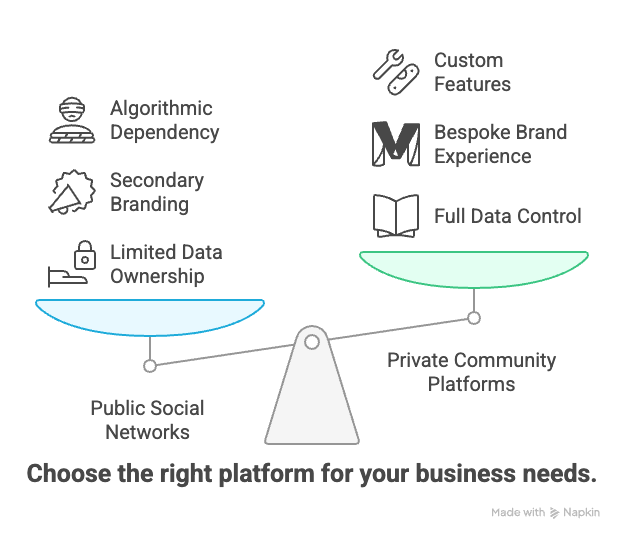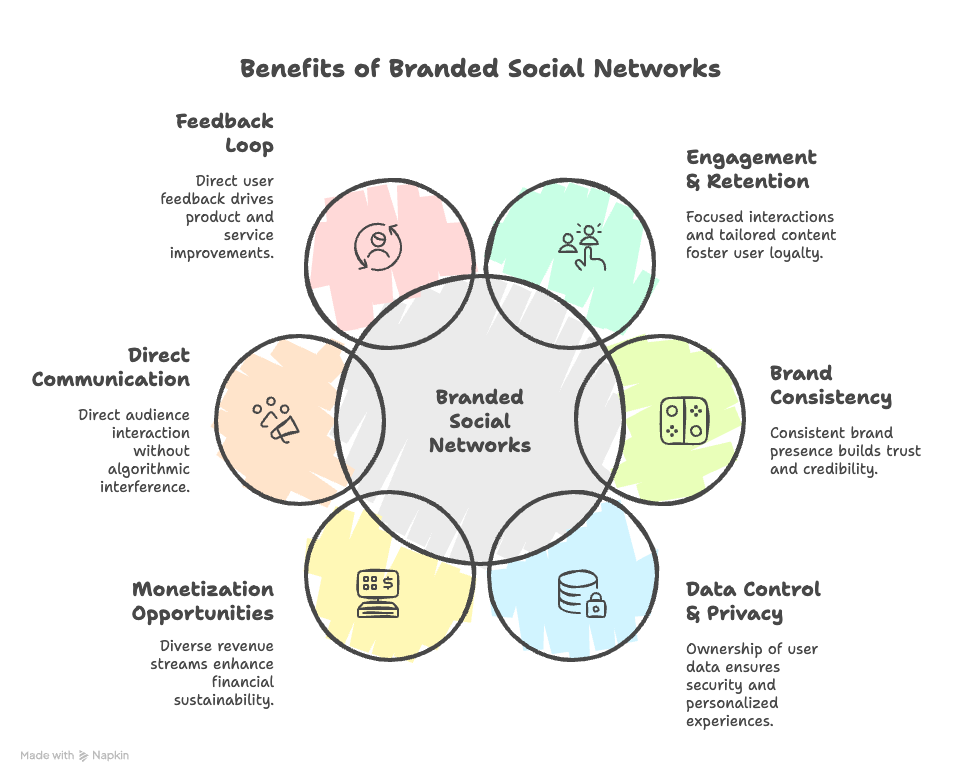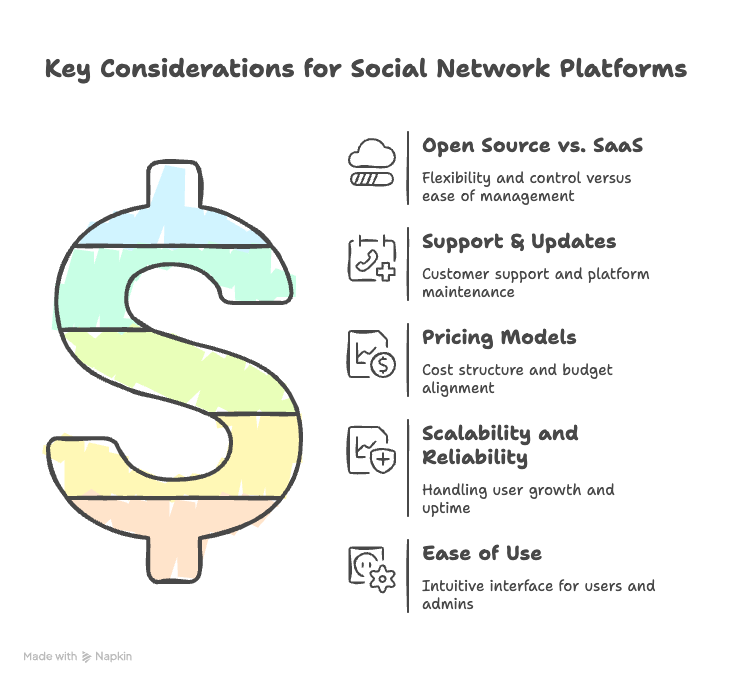Why Your Business Needs a White Label Social Network Platform in 2025

In today’s digital world, building a strong community around your brand, organization, or company isn’t just an option—it’s essential. Public social media offers reach, but often with serious drawbacks. For businesses that want to build stronger relationships, control their message, and own their data, a white label social network platform presents a powerful and increasingly vital solution. If you’re exploring scalable and customizable ways to connect with your audience online, recognizing the value of a dedicated, branded space is the first step towards driving higher engagement and lasting loyalty.
Why Businesses Need Their Own Social Platform – Moving Beyond Public Networks
Relying solely on third-party social networks like Facebook, LinkedIn, or X (formerly Twitter) for community building presents several inherent challenges for businesses:
- Data Ownership & Control: On public platforms, you don’t own your audience’s data; the platform does. This limits your ability to gain deep insights, segment your audience effectively, and ensure data privacy according to your standards.
- Branding Limitations: Your brand is always secondary to the platform’s branding. Customization is minimal, diluting your brand identity and making it harder to create a unique, immersive experience.
- Algorithmic Whims & Pay-to-Play: Your reach is often at the mercy of ever-changing algorithms. Organic visibility can plummet, forcing you into a “pay-to-play” model to reach the audience you’ve already built.
- Community Fragmentation: Your audience might be scattered across multiple platforms, making it difficult to consolidate engagement, share information efficiently, and foster a unified community spirit.
- Distractions & Competition: Public platforms are inherently noisy. Your content competes with countless other posts, ads, and notifications, often from direct competitors, pulling your audience’s attention away.
- Lack of Custom Features: Public platforms offer a one-size-fits-all feature set. You can’t tailor the experience with specific tools or functionalities that your unique community might need (e.g., specialized forums, resource libraries, event management).
- Monetization Restrictions: If direct monetization of your community is a goal (e.g., subscriptions, premium content), public platforms offer limited or no direct avenues, often taking a significant cut.
For organizations that prioritize direct engagement, data sovereignty, and a bespoke brand experience, a private community platform becomes an indispensable asset.

What Is a White Label Social Network Platform?
A white label social network platform is a fully developed software solution that allows businesses and organizations to create their own branded, private, or public social network. Essentially, it’s a “ready-made” community platform that you can customize with your own logo, colors, domain name, and specific features, presenting it to your users as if you built it from scratch.
Think of it as the foundational architecture for your digital community, offering robust social networking capabilities without the extensive time and cost of custom development.
Key Features Typically Include:
- Custom Branding: Full control over the look and feel, including logos, color schemes, custom domain (e.g., community.yourbrand.com), and overall user interface design.
- Scalability: Designed to grow with your community, accommodating an increasing number of users, content, and interactions without performance degradation.
- Comprehensive Moderation Tools: Empowering administrators and moderators to manage content, users, and discussions, ensuring a safe and productive environment.
- Varied Content Types: Support for profiles, activity feeds, groups, forums, direct messaging, articles, polls, events, and media sharing (photos, videos).
- User Management & Roles: Ability to define different user roles and permissions (e.g., admin, moderator, member, guest), controlling access to features and content.
- Engagement Analytics: Built-in tools to track user activity, content performance, community growth, and other key metrics.
- Integration Capabilities: APIs or built-in options to connect with other business tools like CRMs, email marketing platforms, or single sign-on (SSO) systems.
Real-World Applications:
The versatility of a white label social network platform lends itself to numerous applications:
- Corporate Intranets: Fostering internal communication, collaboration, knowledge sharing, and company culture among employees in a secure, branded environment.
- Niche Communities: Creating dedicated spaces for enthusiasts, hobbyists, or professional groups centered around specific interests (e.g., a photography community, a local sports club network).
- Customer/Client Portals: Offering exclusive content, support forums, and a direct line of communication for customers, enhancing loyalty and satisfaction.
- Brand Advocacy Programs: Building a community of brand evangelists, providing them with resources, and empowering them to spread the word.
- Educational Platforms: Facilitating online courses, student interaction, resource sharing, and alumni networks.
- Non-Profit & Member Organizations: Connecting members, organizing events, facilitating discussions, and managing memberships.
Essentially, any organization looking to build a focused, engaged, and controlled digital community can benefit from this type of community engagement software.
Top Benefits for Businesses
Investing in a branded social network offers a multitude of tangible benefits that directly impact your bottom line and brand equity:
- Improved Engagement and Retention:
- A dedicated space free from external distractions encourages more focused and meaningful interactions.
- Users feel a stronger sense of belonging, leading to higher participation and lower churn.
- Tailored content and features cater specifically to your audience’s needs, keeping them coming back.
- Enhanced Brand Consistency and Loyalty:
- Your brand is front and center, reinforcing your identity with every interaction.
- A consistent, professional online presence builds trust and credibility.
- Directly fostering relationships within an owned environment cultivates deeper brand loyalty than is possible on generic platforms.
- Complete Data Control and Enhanced Privacy:
- You own 100% of your user data. This allows for sophisticated analytics, personalized experiences, and targeted communication.
- You can implement privacy policies that align with your organizational standards and regulatory requirements (e.g., GDPR, CCPA), offering a more secure environment for sensitive discussions.
- Diverse Monetization Opportunities:
- Membership Tiers & Subscriptions: Offer premium access to exclusive content, features, or community areas.
- Sell Courses or Digital Products: Directly within your community platform.
- Controlled Advertising: If desired, you can sell ad space to relevant partners without surrendering control to a third-party ad network.
- Sponsorships: Partner with complementary businesses for sponsored content or sections.
- Events: Sell tickets to virtual or physical events hosted through the platform.
- Direct Communication Channel:
- Communicate directly with your audience without battling algorithms or paying for reach.
- Ensure important announcements and updates are seen by your community members.
- Valuable Feedback Loop:
- Your private community platform becomes a goldmine for direct feedback, ideas, and insights from your most engaged users, helping to shape product development and service improvements.
Key Features to Look For in a White Label Social Network Platform
When evaluating different platforms, certain features are crucial for ensuring a successful, scalable, and user-friendly community:

- Mobile Responsiveness & Native Apps:
A significant portion of users will access your community via mobile devices. Ensure the platform is fully responsive or, ideally, offers dedicated iOS and Android apps for a seamless mobile experience. - Deep UI/UX Customization:
Beyond basic branding (logo, colors), look for the ability to customize layouts, navigation, and even disable/enable specific features to perfectly match your community’s purpose and your brand’s aesthetic. - Robust Third-Party Integrations:
The platform should easily connect with your existing tech stack. Key integrations include:- Single Sign-On (SSO): For seamless user login.
- CRM (e.g., Salesforce, HubSpot): To sync user data and activities.
- Email Marketing (e.g., Mailchimp, ActiveCampaign): For targeted communication.
- Analytics (e.g., Google Analytics): For deeper insights.
- Zapier/Integromat: For custom workflow automation.
- Granular User Roles & Permissions:
The ability to define custom roles (e.g., Admin, Moderator, Group Owner, Premium Member) and assign specific permissions to each role is vital for effective community management and content gating. - Comprehensive Analytics and Reporting:
Detailed dashboards showing user growth, engagement rates (likes, comments, shares), popular content, active users, and other KPIs are essential for understanding community health and making data-driven decisions. - Advanced Content Management & Moderation:
Tools for pre-moderation, post-moderation, keyword flagging, user reporting, banning/suspending users, and content scheduling are crucial for maintaining a healthy community. - Security & Compliance:
Ensure the platform adheres to data security best practices, offers SSL encryption, regular backups, and features to help you comply with relevant data privacy regulations.
How to Choose the Right Platform for Your Business
Selecting the ideal white label social network platform requires careful consideration of your specific needs, resources, and long-term goals.

- Open Source vs. SaaS (Software-as-a-Service):
- Open Source: Offers maximum flexibility and control, as you can modify the source code. However, it requires significant technical expertise for setup, maintenance, hosting, and security. Costs can be unpredictable.
- SaaS: Typically easier to deploy and manage, with the provider handling hosting, updates, and security. Usually based on a subscription model (monthly/annual). This is often the preferred route for businesses wanting a quicker, more supported launch. [Explore our SaaS solutions – placeholder for internal link].
- Support & Updates:
What level of customer support is offered (e.g., email, chat, phone, dedicated account manager)? How frequently is the platform updated with new features and security patches? Look for providers with a strong track record and responsive support. - Pricing Models:
Understand the pricing structure. Is it based on the number of users, features, storage, or a combination? Are there setup fees? Ensure the model aligns with your budget and expected growth. Request a clear breakdown. See our pricing - Scalability and Reliability:
Can the platform comfortably handle your anticipated user base and activity levels? What is their uptime guarantee? - Ease of Use (Admin & User):
The platform should be intuitive for both administrators managing the community and end-users participating in it. A clunky interface can kill adoption. Request a demo to experience it firsthand.
Taking the time to thoroughly vet potential providers will save you headaches and resources down the line.
Conclusion: Own Your Community, Own Your Future
In an era where authentic connection and data control are paramount, a white label social network platform is no longer a niche tool but a strategic imperative for forward-thinking businesses. It empowers you to move beyond the limitations of public social media, creating a branded, engaging, and secure environment where your community can thrive.
By taking ownership of your digital community space, you gain unparalleled control over your brand narrative, user data, and engagement strategies. The benefits—from enhanced loyalty and retention to new monetization streams and invaluable customer insights—are too significant to ignore.
Choosing the right solution is key. Evaluate your needs, explore the features, and partner with a provider who understands your vision.
Ready to build a powerful, branded community that drives real business results?
Explore Our Platform Features or View our Demo Today!
Frequently Asked Questions (FAQ)
Q1: What’s the main difference between a white label social network and just using a Facebook Group?
A: The primary differences are ownership, branding, and control. With a white label platform, you own the platform, the data, and the full brand experience. Facebook Groups operate within Facebook’s ecosystem, subject to their branding, algorithms, data policies, and potential distractions. You also get more advanced customization and integration options with a white label solution.
Q2: Is setting up a white label social network platform expensive?
A: Costs can vary widely. Open-source solutions might seem cheaper initially but can incur high development and maintenance costs. SaaS platforms typically have predictable subscription fees, often tiered by users or features. Compared to custom developing a platform from scratch (which can cost hundreds of thousands), white label solutions are significantly more cost-effective.
Q3: How much technical skill do I need to manage a white label social network?
A: For SaaS white label platforms, generally, you don’t need deep technical skills. The provider handles the backend infrastructure, updates, and security. You’ll primarily manage users, content, and configuration through an admin dashboard, which is usually designed to be user-friendly. Open-source options require more technical expertise.
Q4: Can I migrate my existing community from another platform (e.g., a forum or Facebook Group) to a white label solution?
A: Many white label platform providers offer migration support or tools to help import user data and sometimes content from existing communities. The feasibility and complexity depend on the source platform and the capabilities of the chosen white label solution. It’s a crucial question to ask potential providers.
